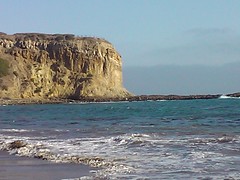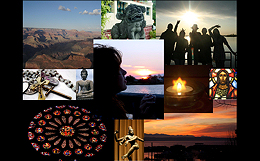From Your Minister
February 1, 2013Podcast: Download (5.2MB)
Subscribe: More
 Are you there, God? It’s me, Meg.
Are you there, God? It’s me, Meg.
Yes, and if you don’t mind, I’ll keep calling you Margaret. It confuses me when you young people are always taking nicknames. It’s hard enough learning one name for each of you! Read more →
REsources for Living
February 1, 2013Podcast: Download (4.7MB)
Subscribe: More
 If you were going to look for God, where would you look? Would you go up on top of a mountain? Would you look in the crashing ocean waves? Would you be more likely to find God in a giant sequoia redwood tree, or in a tiny plant growing in the pinch of soil between mountain rocks? Would you look up towards the stars or down toward the earth that supports us?
If you were going to look for God, where would you look? Would you go up on top of a mountain? Would you look in the crashing ocean waves? Would you be more likely to find God in a giant sequoia redwood tree, or in a tiny plant growing in the pinch of soil between mountain rocks? Would you look up towards the stars or down toward the earth that supports us?
Touching our Strength
February 1, 2013Podcast: Download (840.3KB)
Subscribe: More
 We touch this strength, our power, who we are in the world, when we are most fully in touch with one another and with the world. Read more →
We touch this strength, our power, who we are in the world, when we are most fully in touch with one another and with the world. Read more →
God
February 1, 2013February 2013
“God has no religion.” —Mahatma Gandhi
Articles
A God We Can Believe In
Rev. Galen GuengerichAt home on a bookshelf we have a massive folio-style slipcover book titled Cabinet of Natural Curiosities by Albertus Seba, a pharmacist in eighteenth-century Amsterdam. Read more »
People Ask About God (Excerpt)
Contributing WriterPeople go astray in their search for God because they do not take the right starting-point. We should never begin by asking, “Is there a God?”– as though God could be something outside of ordinary experience; or, to put it in the old-fashioned way, something outside of Nature. Read more »
If I Were Asked
Rev. Victoria SaffordIf I were asked to confess my faith or my beliefs out loud, and I were scrambling for some place to begin, I would start in the desert, in the lonesome valley, and say that first of all and ultimately we are alone. Read more »
Sun/God
Contributing WriterYour missionary ancestors told Indian people that they were worshipping a false god when we prayed to the sun. The sun is the most powerful physical presence in our lives. Read more »
A Prayer
Rev. Dr. Mark BelletiniWorld that is my home,Spirit that matters,Speak to me in the voices of Ralph Waldo Emerson,yes, and Florence Nightingale… Read more »
Reflections on God
Contributing WriterWe asked each of our ministerial interns to share a reflection on what God means to them. Here’s what they had to say. Read more »
From Your Minister
Rev. Meg Riley“Are you there, God? It’s me,” Meg.”Yes, and if you don’ mind, I’ll keep calling you Margaret. It confuses me when you young people are always taking nicknames. It’s hard enough learning one name for each of you!” Read more »
REsources for Living
Rev. Dr. Lynn UngarIf you were going to look for God, where would you look? Would you go up on top of a mountain? Would you look in the crashing ocean waves? Read more »
Touching our Strength
Contributing WriterWe touch this strength, our power, who we are in the world, when we are most fully in touch with one another and with the world. Read more »
What God Intends
October 25, 2012Let’s be fair, here. I’m sure that Richard Mourdock did not in any way mean to defend rape when he said that he thinks that God intends for babies to be born who are conceived through rape. I would hope that no one could believe in a God who intends for women to be raped. But I’m sure there are brave women who have borne their rapist’s baby, whether that rapist is a husband, boyfriend or stranger, and who regard their child as something precious that managed to grow from a terrible beginning. Such is the amazing resilience that can come to the human heart, and wouldn’t God be present in that beautiful redemption?
But let’s get real here for a moment. One could certainly imagine a God who could redeem even something as terrible as rape through the love of an innocent child. But when did it become the government’s job to determine on God’s behalf that this is the necessary outcome? For every woman who has chosen to keep and love a child conceived through rape there are probably many more who choose a morning after pill or abortion to end a pregnancy that they never wanted, and which would be an intolerable life-long symbol of a great violation. Why would you assume that God is not in that decision as well? Why wouldn’t God be there at the side of a woman as she struggles to reclaim her life and her strength and her ability to move forward in the world? Is God not in that woman’s choice to restore her own integrity and wholeness as she understands it?
I won’t presume to speak for God, but I will tell you what I think. When a woman is raped, God’s body is torn as her body is torn. When a fetus is aborted, some piece of God’s potential is lost. But God’s potential is infinite, and a woman reclaiming her life is no less a part of God’s potential. Indeed, every moment when every person chooses life, whatever that might mean to that person at the time, is a part of the potential of God unfolding.
It isn’t the job of politicians to decide which bits of potential God finds most precious. It is the job of each us, day by day and minute by minute, to decide what will constitute life more abundant for ourselves and the world we inhabit, and to act as the body of God in living out that choice. The role of the government is to support those decisions or get out of the way.
A Personal Relationship with God
June 7, 2012The aspect of my personal faith that seems to bring about the most confusion in friends and colleagues is that I believe I have a deep and abiding personal relationship with a God that is incapable of knowing that I even exist.
abiding personal relationship with a God that is incapable of knowing that I even exist.
I find that the confusion about this theological point rests not only with those more theologically conservative than I, but also with those more theologically liberal or secular than I. More conservative ministers and theologians are confused by my claim that I can have a personal relationship with a non-personal God. My more liberal and secular colleagues question the same thing, but with the opposite emphasis.
While I have talked about this in other articles (including here), I believe that there is no division in God, that every moment of every day we are intimately involved with God; in a flight of birds, in a breath of wind, in a cab driver who cuts us off, in a moment on the Zen cushions… all one, all God. We are a part of God, and nothing can be more intimate than this. God is a holy spirit that is intimately involved in all things, and we are intimately involved in the part of God we can touch and sense.
However, God does not, in any personal way, know that I exist as an individual. I wonder whether God is even capable of “knowing” in any human sense. More, my faith in God does not require God’s knowing of me. I am “known” simply in my being, along with all of being, and together we are becoming… and becoming… and becoming.
I do not believe that God is “consciously” involved in human life, except that we are a part of God, and we are consciously involved in our own lives. Human Free Will is a part of God. What prevents us from sensing this is our own delusion of division and self… our own conflicted natures. Issues of whether God is omniscient or omnipotent depend upon God having a human understanding of knowing or of power, and I do not believe that to be true. God simply is, and we relate to God because of that.
As one minister/professor colleague of mine has said to me, this theological stance is fairly complex, and inspired by both my understanding of Christian Faith and my experience of Zen Buddhism. It is in part this belief that holds me in Unitarian Universalism, in that it inspires in me my connection to the inherent worth of all beings and the interconnectedness of all existence, two core principles of Unitarian Universalism.
A few years ago, in a communication within the Army Chaplain Corps, I found this statement: “Whereas the Chaplaincy, as spiritual leaders, model faith and belief in the Hand of God to intervene in the course of history and in individual lives;”. Now, I can do some theological circumlocutions and come to a place where I can accept that statement (if not agree with it), those circumlocutions are somewhat intensive. I certainly could not accept it in its obvious, literal intent. For me, God does not intentionally intervene in human history or individual lives… God simply is, and human history and individual lives change and mold in reaction to God’s existence. To paraphrase Albert Einstein, God does not play dice with the Universe, because God is the Universe and all within it.
If a belief in an intervening God who has a personal relationship with individual lives is a prerequisite to be a military chaplain, then perhaps I have some thinking to do about my call to ministry. If, rather, the document that quote was taken from actually is trying to define what the theological center of the Chaplain Corps is, then I accept that I am theologically on the margins but can still find a place. I will, in Unitarian Universalist prophetic tradition, continue to speak my truth, the truth that is written on my heart by my life, by scripture, by the flight of birds and the existence of evil, and let “Einstein’s Dice” fall how they may.
Yours in Faith,
Rev. David
Renew Your Membership
We invite you to join your fellow CLFers to renew your CLF membership and stewardship of the CLF for another year.
Support the CLF
Can you give $5 or more to sustain the ministries of the Church of the Larger Fellowship?
If preferred, you can text amount to give to 84-321
Newsletter Signup
About
Quest for Meaning is a program of the Church of the Larger Fellowship (CLF).
As a Unitarian Universalist congregation with no geographical boundary, the CLF creates global spiritual community, rooted in profound love, which cultivates wonder, imagination, and the courage to act.
Contact
Church of the Larger Fellowship Unitarian Universalist (CLFUU)
24 Farnsworth Street
Boston MA 02210



